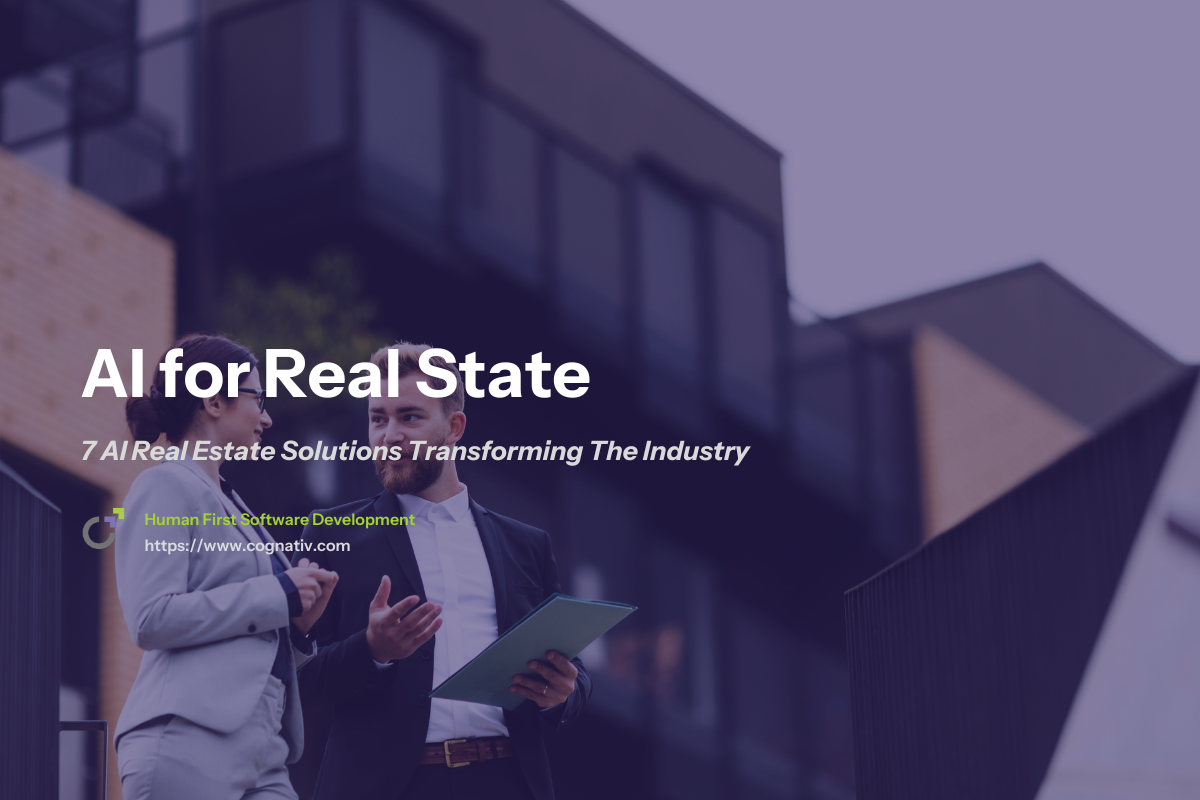7 AI Real Estate Solutions Transforming The Industry
Artificial intelligence is no longer a side project in the real estate industry—it’s a competitive operating system. The rapidly expanding AI ecosystem, powered by advanced AI, now gives real estate agents and real estate professionals the tools to generate higher-quality leads, set sharper prices, run leaner property management operations, and deliver a superior client experience at scale.
Below, we break down the seven AI capabilities that matter in 2025, how to leverage AI with a solid foundation, and what to watch across commercial real estate and the residential real estate market. AI-driven automation is also streamlining operations and improving efficiency for agents and professionals.

Why AI, Why Now?
Margins are tighter, cycles are shorter, and clients expect instant answers.
Shifts in the labor market and the growing need for supporting infrastructure are accelerating the adoption of AI in real estate.
AI-powered tools convert messy market signals into data-driven insights, freeing real estate agents from time-consuming tasks to focus on relationships and closing deals.
The firms that stay ahead are those that connect AI integration to revenue (lead quality, conversion), cost (automation), and risk (forecast accuracy, compliance).

The Benefits of AI in Real Estate
The integration of artificial intelligence into the real estate industry is transforming how real estate agents and professionals operate on a daily basis. AI-powered tools are streamlining workflows by automating repetitive and time-consuming tasks such as data entry, lead qualification, and managing property listings.
This shift allows real estate agents to dedicate more time to building relationships, closing deals, and delivering a superior client experience.
With advanced predictive analytics, agents can identify potential buyers, anticipate market trends, and optimize listings to attract quality leads. These data-driven insights empower real estate professionals to make smarter decisions, respond quickly to market changes, and maintain a competitive advantage.
By leveraging AI capabilities, the real estate industry is not only boosting productivity but also enhancing client interactions and ensuring agents stay ahead in an increasingly dynamic market.

1) Lead Intelligence & Scoring (Demand Generation Engine)
What it is: ML-based lead generation and lead scoring that ranks prospects by intent and fit. These tools help agents generate leads and manage real estate leads more effectively.
How it works: Machine learning analyzes historical data, engagement patterns, and market trends to identify quality leads and surface potential buyers or motivated sellers first.
Impact: Fewer cold calls, more meetings that convert. Improved lead intelligence directly supports agents in closing deals. Real estate agents move from volume to precision while automated follow-ups keep hot prospects warm.
Where it fits: Team CRMs, IDX sites, and paid media funnels for both commercial real estate and residential.

2) Search, Matchmaking & Market Intelligence
What it is: AI-assisted property search that pairs inventory with buyer profiles.
How it works: Predictive analytics and AI algorithms map buyer preferences to property listings, neighborhood and amenity data, and live inventory. Integrated neighborhood insights provide up-to-date, detailed data about specific neighborhoods, helping match buyers to properties more effectively.
Impact: Faster “right-fit” matches, fewer tours with poor fit, better client interactions.
Where it fits: Consumer portals, brokerage websites, and agent search apps for the real estate market.

3) Pricing & Valuation (AVMs Evolved)
What it is: Next-gen automated valuation models using generative AI and structured comps.
How it works: Models blend comps, market insights, time-on-market, seasonality, and supply/demand to forecast property values and optimal list/offer bands.
Impact: Sharper pricing, reduced days on market, higher win rates in multiple-offer scenarios.
Where it fits: Listing presentations for real estate agents, underwriting workflows for real estate investors, and review layers in commercial real estate.

4) Marketing Automation & Content at Scale
What it is: AI that produces listing copy, micro-videos, emails, and social media posts aligned to target segments, tailoring content to the target audience for maximum engagement.
How it works: Generative AI converts inputs (photos, floor plans, square footage, comps) into multi-format campaigns with A/B optimization.
Impact: Consistent pipeline of qualified traffic, less time-consuming manual production, more time for building relationships.
Where it fits: Brokerage and team marketing stacks; single-agent growth playbooks.

5) Virtual Staging & Visualization (Show, Don’t Tell)
What it is: Virtual staging and 3D experiences that transform empty rooms and dated finishes into believable, on-brand designs.
How it works: AI renders multiple styles, materials, and layouts; pairs with virtual tours to preview renovations and test buyer reactions.
Impact: Higher click-through on listings, better online conversion, faster closing deals—especially for new builds and value-add properties.
Where it fits: Listing prep, off-plan sales, and commercial real estate pre-leasing.

6) Property Management & Operations (The Quiet Profit Center)
What it is: AI that runs property management like a yield business—rent optimization, maintenance triage, and tenant experience.
How it works: Models forecast renewals, detect churn risk, and schedule work orders; AI chatbots handle routine tenant requests and payments.
Impact: Fewer vacancies, lower service costs, steadier NOI; real estate companies get clean dashboards with alerts and actions.
Where it fits: Multifamily, SFR portfolios, mixed-use real estate business operations.

7) Client Service Layer: Chat, Copilots & Agentic AI
What it is: Always-on AI chatbots, voice bots, and agentic AI copilots that take actions (book showings, draft offers, trigger disclosures) under human oversight. An AI assistant supports agents by handling routine tasks and client communications, acting as a reliable, always-available helper.
How it works: Conversational models tied to your CRM and transaction checklists; virtual assistants handle FAQs, disclosures, and documents while agents review and send.
Impact: Faster response times, fewer dropped threads, measurable lift in customer satisfaction.
Where it fits: Every team that wants to scale service without diluting the brand.

AI-Powered Solutions for Real Estate Agents
Today’s real estate agents have access to a growing suite of AI-powered solutions designed to boost productivity and elevate client engagement. AI chatbots can instantly respond to inquiries, qualify leads, and direct them to the right agent, ensuring no opportunity slips through the cracks.
Virtual staging and immersive virtual tours powered by AI help potential buyers visualize properties, increasing engagement and accelerating decision-making. AI tools also support lead scoring and deliver predictive analytics, giving agents actionable market insights to target their outreach and marketing efforts more effectively.
Automated social media posts and follow-ups nurture leads and keep agents top-of-mind with their audience, all while saving valuable time. By embracing these AI-powered solutions, real estate agents can streamline operations, focus on high-value activities, and deliver exceptional experiences that set them apart in a competitive real estate market.

Applications Across Segments
The real estate industry is undergoing a technological revolution, with AI for real state playing a pivotal role in reshaping real estate operations across various segments. By leveraging many AI tools and tech tools, real estate agents and professionals can streamline operations, enhance lead generation, and improve client experiences.
From commercial real estate to the residential real estate market, AI-powered solutions are enabling smarter decision-making, more accurate mortgage calculators, and efficient management of property listings. This integration of AI is helping real estate companies and investors harness AI strategically to stay ahead in a rapidly evolving market.
Commercial Real Estate
Portfolio-level predictive analytics for absorption, property values, and tenant credit risk.
Scenario planning for investment and revenue models; pipeline scoring for corporate expansions.
Generative AI “what-if” analyses for capex, leasing, and financing options.
Residential Real Estate Market
Hyperlocal pricing bands, property searches that reflect lifestyle filters, and instant offer prep.
AI chatbots that qualify potential clients, capture lead behavior, and orchestrate automated follow-ups.

Building on a Solid Foundation: How to Implement AI
Data Readiness – Consolidate CRM, web, and transaction data; clean duplicates; define governance.
AI Integration – Start with two high-ROI use cases (lead scoring + pricing) and connect to existing systems.
Process Design – Document “who approves what” so real estate agents trust the outputs.
Change Enablement – Train teams; set SLAs for the ai chatbots and virtual assistants; measure adoption.
Scale – Expand to property management, marketing, and commercial real estate underwriting.
Tip: Treat “AI integration” as a program, not a plugin. The best results come when leaders leverage AI to redesign workflows, not just automate the old ones.

Security, Ethics & Risk Controls
AI security: Encrypt customer data, apply least-privilege access, and log model usage.
Bias & Fairness: Add human review to high-impact decisions (valuations, loan referrals, rental screenings).
Compliance: Align disclosures for automated content; keep human sign-off on offers and agency documents.
Maintenance: Version your ai models and prompts; re-train as market trends shift.

What “Great” Looks Like?
Real estate agents run on copilots: prospecting, pricing, and paperwork accelerated by AI.
Real estate professionals use dashboards with next-best actions and confidence scores.
Property management teams automate 60–80% of routine tasks while lifting tenant CSAT.
Leadership ties real estate AI metrics to revenue, absorption, and pipeline velocity.

The Future of AI in Real Estate
Looking ahead, the future of AI in the real estate industry promises even greater transformation. As AI capabilities advance, real estate professionals and investors will benefit from more sophisticated, integrated solutions that reshape real estate operations from end to end.
Generative AI will enable the creation of highly personalized property listings, dynamic virtual tours, and tailored marketing materials, making it easier to connect with potential buyers and stand out in the market. Predictive analytics will become more precise, offering real estate investors and agents deeper insights into market trends and buyer behavior.
The convergence of AI with machine learning and IoT technologies will unlock new possibilities for property management, smart buildings, and client service. By harnessing AI strategically and embracing ongoing technological transformation, real estate professionals can drive efficiency, boost productivity, and deliver superior client satisfaction—ensuring they remain leaders in a rapidly evolving real estate sector.

The Shortlist: Best AI Tools to Prioritize
Lead Engine: intent detection, lead scoring, and nurture journeys.
AVM & Pricing: comps + seasonality + sentiment for smarter property values.
Marketing Studio: generative AI for listings, video, and social media posts. Automate email campaigns triggered by new listings to engage potential buyers with the latest property updates.
Virtual Staging: multi-style renders; instant virtual tours.
Ops/PM Suite: rent/renewal forecasts, work-order routing, and tenant ai chatbots.
Agent Copilot (Agentic AI): action-taking assistant connected to your checklists and e-signature stack.
Analytics Hub: portfolio-level predictive analytics for commercial real estate and residential.
Bottom Line
In 2025, AI for real estate is about speed to insight, precision in action, and consistency in service. Teams that leverage AI across lead generation, pricing, property management, marketing, and service will out-learn and out-execute their peers. Start with a solid foundation, pick two high-impact use cases, and scale with discipline. The payoff is a leaner operation, happier clients, and a durable competitive advantage in any market.


